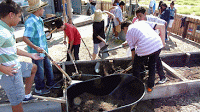
LIDIA VAZQUEZ
E-I-E-I-Grow Project
In the design portion of the project I learned some really cool concepts. First, I learned how to manipulate SketchUp, a 3-D designing program, to design anything I wanted. This allowed me to create a wood fired oven, brick by brick. I was able to relate this to Photoshop. This was another form of art for me. I was able to picture and create a design from all sides. I also made the blue print so that it could help me in design skills for the wood fired oven as well for the future. This all helped me to have an idea of how to use programs related to SketchUp and Photoshop. In this project I also learned how to design signs in Illustrator. Another design portion that I learned more about, was designing posters in Photoshop.
I contributed to my groups work by helping with the project. Some examples are: First, I designed the wood fired oven to scale in SketchUp and drew the blueprints for the wood fired oven by myself. I also helped a little bit on the scale model. I did most of the research for our group and I found a lot of information about woodfired ovens and the agriculture of farming to contribute to my group.
In my research for exhibition I learned some reading and writing concepts. Like for exhibition my group and I did something different since we are in the leadership team, we made posters and explained the process and what we are learning and using for film equipment. We wanted publicity towards our documentary and our project didn't require as much reading. All though in the first exhibition my station talked about the Omnivore’s Dilemma and how it had opened our eyes and allowed us to view industrial food in another perspective. In which of course we had to read the Omnivore’s Dilemma. It was very life changing for some students, but for some not so much. We learned how to process what we were reading more in depth. For example: My favorite QQC, which stands for Quote, Question, Comment. This was my favorite writing and reading comprehension exercise. It allowed me to think more about every word and what I thought about it and could relate to it.
During this project,I also learned some science concepyts. First for us to get a understanding of GMOs or Genetically Modified Organism’s, he teached us first the basics for example the 7 characteristics of life, I memorized all 7. Then we learned about life substances, which include the following, Atoms, Molecules and Polymers, Carbohydrates, and lipids.This entertained me because it was confusing and puzzling and I get entertained when something is confusing because, I have an urge of understanding this mystery so I find it interesting. Then we looked more in proteins and Amino acids,Enzymes,Nucleic acids and DNA. What I found most difficult was genetics, in the form that that YY crossed with a yy will equal always Yy,why this confuses me but not in the good way.Some research skills I learned were how to gather information from articles and take it in and comprehend it.
Something that others could learn from my experience is. Enjoy every piece of information that is given to you,and if you're not patient or a perfectionist do not sign up for sketchup it will be stressful.
Somethings I learned during the transformation of our garden into a farm were. I learned how to cut pc pipes and set up all the irrigation system and use power tools and learned how to plant seeds.My biggest challenges were, I was able to step up and become a leader which I found very cool. Something that really stood out to me was how everything fit together in this project.
ESSENTIAL QUESTIONS
" How does writing impact society"?
Writing impacts society, by being able to change their perspective and really be able to control and add emotions or a perspective and inform the reader. Having this power you can create a voice and a movement using writing as your tool. For example in The Omnivores Dilemma Michael Pollan uses writing to perform a point of view about industrial food, this book is one sided and really explains his perspective and supporting evidence. I as a reader of this book have to admit that I was moved into his perspective, thanks to this book. I have been seeing the industrial food chain really differently.
What impact has the change of agriculture throughout history had on our food?
In the beginning of farming they would farm organic and would plant witch ever crop they could by seasons, but know they mostly just plant corn or soya beans. Now instead of using horses and putting seed by seed requiring a lot of farmers. But know There's just one farmer pressing a button to control everything. And using genetically modified corn to grow and be a certain way.
What rights do costumers have about the information regarding their food? Costumers have the right to know the information regarding there food, just most of them choose not to, we have so many books written about all the information regarding food and documentary's and articles some costumers gain concise with this recourses but most of them do not.



